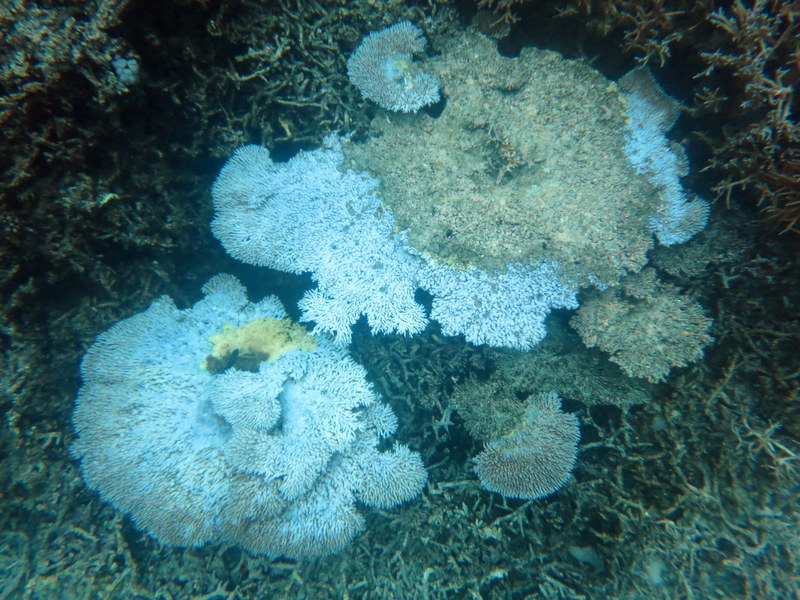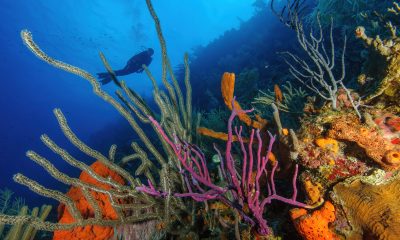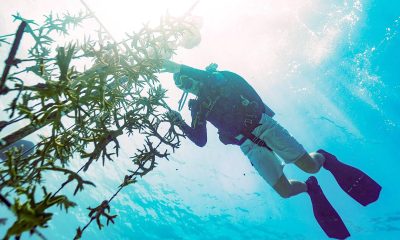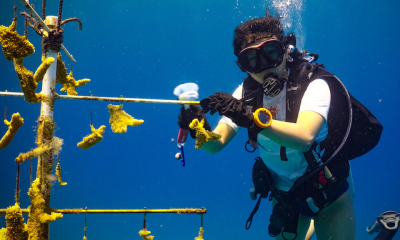News
Coral bleaching threat increasing in western Atlantic and Pacific oceans

As unusually warm ocean temperatures cover the north Pacific, equatorial Pacific, and western Atlantic oceans, National Oceanic and Atmospheric Administration (NOAA) scientists expect greater bleaching of corals on Northern Hemisphere reefs through October, potentially leading to the death of corals over a wide area and affecting the long-term supply of fish and shellfish.
While corals can recover from mild bleaching, severe or long-term bleaching kills corals. Even if corals recover, they are more susceptible to disease. Once corals die, it usually takes decades for the reef to recover — but recovery is only possible if the reefs are undisturbed. After corals die, reefs degrade and the structures corals build are eroded away, providing less shoreline protection and less habitat for fish and shellfish.
“The bleaching that started in June 2014 has been really bad for corals in the western Pacific,” said Mark Eakin, NOAA Coral Reef Watch coordinator. “We are worried that bleaching will spread to the western Atlantic and again into Hawaii.”
Earlier this year, NOAA’s Coral Reef Watch four-month Coral Bleaching Outlook accurately predicted coral bleaching in the South Pacific, including the Solomon Islands, Papua New Guinea, Nauru, Fiji, and American Samoa. It also recently predicted the coral bleaching in the Indian Ocean, including the British Indian Ocean Territory and the Maldives.
Coral bleaching occurs when corals are stressed by changes in environmental conditions such as temperature, light or nutrients. The coral expels the symbiotic algae living in its tissue, causing the tissue to turn white or pale. Without the algae, the coral loses its major source of food and is more susceptible to disease. Scientists note, however, that only high temperatures can cause bleaching over wide areas like those seen since 2014.
In fall 2014, Hawaii saw widespread coral bleaching for the first time since 1996. If corals in Hawaii bleach again this year, it would be the first time it happened in consecutive years in the archipelago.
Warmer ocean temperatures in 2014 also dealt a blow to coral nurseries in the Florida Keys, where scientists are growing threatened coral species to transplant onto local reefs. Coral reefs in Florida and the Caribbean have weathered repeated and worsening coral bleaching events for the past thirty years. The NOAA Coral Reef Watch monitoring team says that more bleaching so soon could spell disaster for corals that have yet to recover from last year’s stress.
“Many healthy, resilient coral reefs can withstand bleaching as long as they have time to recover,” Eakin said. “However, when you have repeated bleaching on a reef within a short period of time, it’s very hard for the corals to recover and survive. This is even worse where corals are suffering from other environmental threats, like pollution or overfishing.”
NOAA’s bleaching prediction for the upcoming months supports the findings of a paper published in the journal Science last week that examined the threat to marine ecosystems and ecosystem services under two different carbon dioxide emission pathways.
“The paper reports that even if humans limit the Earth’s warming to two degrees C (3.8 degrees F), many marine ecosystems, including coral reefs, are still going to suffer,” said Eakin, an author on the paper. “The increase we are seeing in the frequency and severity of bleaching events is part of why the climate models in that paper predict a dire future for coral reefs.”
The NOAA Coral Reef Watch program’s satellite data provide current reef environmental conditions to quickly identify areas at risk for coral bleaching, while its climate model-based outlooks provide managers with information on potential bleaching months in advance. The Coral Reef Watch mission is to utilize remote sensing and in situ tools for near-real-time and long term monitoring, modeling and reporting of physical environmental conditions of coral reef ecosystems.
The four-month Coral Bleaching Outlooks, based on NOAA’s operational Climate Forecast System, use NOAA’s vast collection of environmental data to provide resource managers and the general public with the necessary tools to help reduce effects of climate change and other environmental and human caused stressors.
The outlook is produced by NOAA’s Satellite and Information Service and funded by the Coral Reef Conservation Program, Climate Program Office, and National Centers for Environmental Prediction.
For more information on coral bleaching and these products, click here.
NOAA’s mission is to understand and predict changes in the Earth’s environment, from the depths of the ocean to the surface of the sun, and to conserve and manage our coastal and marine resources. You can find the NOAA on Facebook, Twitter, Instagram and other social media channels.
Source: www.noaanews.noaa.gov
News
Dive Worldwide Announces Bite-Back as its Charity of the Year

Over the next 12 months, specialist scuba holiday company Dive Worldwide will be supporting Bite-Back Shark & Marine Conservation with donations collected from client bookings to any one of its stunning dive destinations around the world. The independently-owned operator expects to raise £3000 for the UK charity.
Manager at Dive Worldwide, Phil North, said: “We’re especially excited to work with Bite-Back and support its intelligent, creative and results-driven campaigns to end the UK trade in shark products and prompt a change in attitudes to the ocean’s most maligned inhabitant.”
Bite-Back is running campaigns to hold the media to account on the way it reports shark news along with a brand new nationwide education programme. Last year the charity was credited for spearheading a UK ban on the import and export of shark fins.
Campaign director at Bite-Back, Graham Buckingham, said: “We’re enormously grateful to Dive Worldwide for choosing to support Bite-Back. The company’s commitment to conservation helps set it apart from other tour operators and we’re certain its clients admire and respect that policy. For us, the affiliation is huge and helps us look to the future with confidence we can deliver against key conservation programmes.”
To launch the fundraising initiative, Phil North presented Graham Buckingham with a cheque for £1,000.
Visit Dive Worldwide to discover its diverse range of international scuba adventures and visit Bite-Back to learn more about the charity’s campaigns.
MORE INFORMATION
Call Graham Buckingham on 07810 454 266 or email graham@bite-back.com
Gear News
Scubapro Free Octopus Promotion 2024

Free Octopus with every purchase of a SCUBAPRO regulator system
Just in time for the spring season, divers can save money with the FREE OCTOPUS SPRING PROMOTION! Until July 31st SCUBAPRO offers an Octopus for free
with every purchase of a regulator system!
Get a free S270 OCTOPUS with purchase of these combinations:
MK25 EVO or MK19 EVO with A700
MK25 EVO or MK19 EVO with S620Ti
MK25 EVO or MK19 EVO with D420
MK25 EVO Din mit S620Ti-X
Get a free R105 OCTOPUS with purchase of the following combinations:
MK25 EVO or MK19 EVO with G260
MK25 EVO or MK17 EVO with S600
SCUBAPRO offers a 30-year first owner warranty on all regulators, with a revision period of two years or 100 dives. All SCUBAPRO regulators are of course certified according to the new European test standard EN250-2014.
Available at participating SCUBAPRO dealers. Promotion may not be available in all regions. Find an authorized SCUBAPRO Dealer at scubapro.com.
More information available on www.scubapro.com.
-

 News3 months ago
News3 months agoHone your underwater photography skills with Alphamarine Photography at Red Sea Diving Safari in March
-

 News3 months ago
News3 months agoCapturing Critters in Lembeh Underwater Photography Workshop 2024: Event Roundup
-

 Marine Life & Conservation Blogs3 months ago
Marine Life & Conservation Blogs3 months agoCreature Feature: Swell Sharks
-

 Blogs2 months ago
Blogs2 months agoMurex Resorts: Passport to Paradise!
-

 Blogs2 months ago
Blogs2 months agoDiver Discovering Whale Skeletons Beneath Ice Judged World’s Best Underwater Photograph
-

 Gear Reviews2 weeks ago
Gear Reviews2 weeks agoGEAR REVIEW – Revolutionising Diving Comfort: The Sharkskin T2 Chillproof Suit
-

 Marine Life & Conservation2 months ago
Marine Life & Conservation2 months agoSave the Manatee Club launches brand new webcams at Silver Springs State Park, Florida
-

 Gear Reviews3 months ago
Gear Reviews3 months agoGear Review: Oceanic+ Dive Housing for iPhone
















